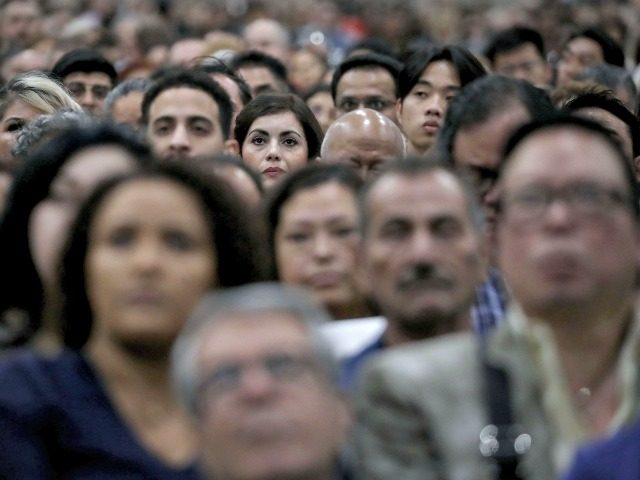Americans sharply underestimate other Americans’ opposition to legal migration, according to a January survey by a pro-establishment thinktank.
The “American Aspirations Index” survey asked 2,010 people to rank their political priorities and to estimate other people’s priorities.
Individual Americans in the survey said they believe other Americans rank “[Being] open to immigration” as their 18th priority in a list of 55 civic priorities.
But all Americans actually ranked “[Being] open to immigration” as only their 42nd priority in the list of 55 suggested priorities, the Americans told the survey organizers at the Populace thinktank.
That is bad news for the Democrat Party and the business groups who are trying to push President Joe Biden’s giant amnesty through Congress. That bill would add roughly one new immigrant to the population for every American born in the next 10 years.
But the bad news was already recognized by many GOP and Democrat politicians who carefully read polls and keep their ears to the ground. For example, on March 4, Politico reported that Biden’s amnesty bill has “dismal” support among House Democrats.
The survey showed that people who voted for Joe Biden overestimated “[Being] open to immigration” as the nation’s 18th priority instead of the 42nd priority that it earned from all Americans.
Similarly, people who voted for Donald Trump also overestimated “[Being] open to immigration” as the 21st national priority, instead of the 42nd rank it earned from all Americans.
Overall, the data shows that Americans favor legal immigration far less than the progressives and business groups who have repeatedly claimed since the Cold War 1950s that the United States is and must always be a “Nation of Immigrants.”
Trump’s voters were very anti-migration, personally saying that “[Being] open to immigration” was their 52nd priority out of 55.
They also gave “severely restricts immigration” their third priority, right after their second priority — “secure national borders” and their first priority, “People have individual rights (e.g., free speech, peaceful assembly, to keep and bear arms, freedom of religion).”
But even the Biden voters were only tepid supporters of “[Being] open to immigration.”
They gave it a 27th priority, below other priorities such as “people have jobs they enjoy” or “Has modern infrastructure systems across the country (e.g., transportation, electricity, Internet).”
“Biden voters see openness to immigration as one of many competing priorities,” the report rationalized.
In the wake of Donald Trump’s presidency, Biden’s voters also put “severely restricts immigration” as their 46th priority and “secure national borders” as their 31st priority.
The poll did not ask voters if legal immigration should be modestly restricted to help Americans get jobs, buy houses, help families, and build savings.
The survey showed that Americans agree on many priorities and prefer that other Americans be free and prosperous more than they prefer the U.S. economy expand or dominate other countries. The survey reported:
That the future of the country guarantees “People have individual rights’’ emerged as the absolute top attribute in Americans’ personal priorities. Note that its respective share of preference (14.43) more than doubles that of the second-highest ranking attribute (healthcare: 6.67). Meaning, Americans’ commitment to individual rights isn’t simply deep-rooted; it significantly outweighs any other rival priority.
…
Not only does a thriving middle class matter more to Americans overall, it also matters for those at opposite ends of the economic spectrum. For low income households (those making less than $35,000 per year) and high income households (those making more than $75,000 per year) “A thriving middle class” is the 11th and 10th ranked personally-held priority for the future of the country respectively, whereas “Has a strong economy” is outside the top fifteen national aspirations for both groups (#18 for each).
…
What is equally clear is that Americans don’t prioritize equal outcomes. Consider that “Has very little income inequality” ranked in the bottom fifteen of personally-held national aspirations (#41 out of a possible 55 attributes).
Globalist competition takes a back seat to Americans’ domestic concerns, the report noted:
The bottom line: Issues like national unity and exceptionalism (defined by international comparison) are not part of Americans’ aspirations for the country. Instead, Americans prioritize issues related to quality of life over national achievements.
For years, a wide variety of pollsters have shown deep and broad opposition to labor migration, and to the inflow of temporary contract workers into jobs sought by young U.S. graduates.
The multiracial, cross-sex, non-racist, class-based, intra-Democratic, and solidarity-themed opposition to labor migration coexists with generally favorable personal feelings toward legal immigrants and toward immigration in theory — despite the media magnification of many skewed polls and articles that still push the 1950s corporate “Nation of Immigrants” claim.
The deep public opposition is built on the widespread recognition that migration moves money from employees to employers, from families to investors, from young to old, from children to their parents, from homebuyers to real estate investors, and from the central states to the coastal states.

COMMENTS
Please let us know if you're having issues with commenting.